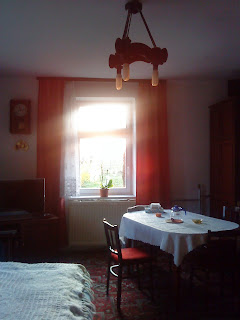The same weekend that I went to Wisła (Vistula), I also got a chance to visit my aunt near Bielsko-Biała. It was good to see my aunt after 3 years and she was really excited about seeing me as well. She kept fussing around me, making sure that I wasn’t hungry, or cold and that I was looking after myself—she was behaving pretty much like any good polish mum’s would.
As I spent time there, I realised that Polish families are quite different to those from other countries—including Australia. Many people when they come across Polish families find family dynamics very overwhelming, and some even can’t handle them.
I remember a time when I brought home an Aussie boyfriend. When he met my family and realised how involved they are in my life, he found it a bit frightening and so he tried to distance himself but in the end that was the relationships main pitfall. I know that I’m not the only one who’s struggled introducing their Aussie boyfriend/girlfriend to our Polish family. Other people in my family have also experienced the gulf that exists between family dynamics in Australian culture and that of Polish culture.
So what is so different about Polish families? The explanations are endless and may probably vary from family-to-family and may change as people acclimatise themselves with their acquitted culture, but for me the difference that I have seen is the involvement of Polish families in the lives of their children as well as in the lives of relatives outside of the immediate family.
You see, often you’ll find children that have grown-up still living with their parents and living under their parents “rule”. Sometimes—although it is less common now-a-days—you may even find several generations living together under the directive of the “head of the family” or the main bread-winner.
These people do not simply share their residence but in effect also share their resources (food, money, appliances, etc.), lives and sometimes decision outcomes. So as you can see, there is no room for “privacy”, but the need for collaboration, reliance and interaction rules within the family unit. This is quite different from Australian culture which tends to push “the young” from the nest as soon as they are old enough.
I believe that Polish family dynamics are largely dictated by the past. After World War and during Communism people did not have the financial resources, security, stablity nor the ability to buy or rent a house and move away. So, as a result, families kept living together, saving resources and contributing towards the creation of this type of family dynamic.
In those days, the only way for a person to acquire a place of their own was to marry or to have a property passed down through the family. And so people lived with their parents until such time as they found a husband or their family’s property was passed down to them.
Even in my own family, my dad received his house from his father while his two sisters had to marry to secure a future for themselves. Once they married their husbands and their families became responsible for providing for them and their future families. I guess, as a side note, this is also the reason why during the time that my parents were growing up there was so much pressure on finding a life partner. As it meant stability, support and foundation for the rest of their lives.
As I spoke to my aunty during my visit, she told me that her dad and another person from church helped to set her up with her husband. Her dad considered her husband’s family and thought that since they were a well to do Christian family, they would be worth having in the family. So in the end, my aunties feelings towards my uncle became only a formality needed for the marriage to proceed.
Today life looks slightly different, young people in Poland have more opportunities and choices. They have the financial stability to be able to study, work and live anywhere they like and therefore many of them move out of home earlier and begin independent lives. Over time, I believe, this will change the family dynamics of relations. But for the time being the closeness and collective nature of families continues to be strongly felt and continues to, on one hand, frustrate people like me, but on the other hand, provide a caring and loving environment which provides stability and support within families. It would be sad to lose this aspect of family as culture changes.
In a way, over the last four years I have strayed from the traditional “Polish family” environment. I have been living an independent life away from my parents and siblings. Living in Sydney, over 1500km away from my closest family (now even further), I’ve become accustomed to privacy and ability to make my own decisions and choices.
It was an interesting experience visiting my aunty who still thinks in the “traditional Polish family” style. At times I felt frustrated that at 26 I’m still being told what to do and how to do it. I also felt frustrated that finding a husband is expected to be my “priority”.
Now, as I reflect on all of this, I realise that my aunt was not being spiteful or deliberately frustrating, but she was acting in a way that has been ingrained in her through the environment that she has grown up in. I can’t blame her and I can’t expect her to change, all I can do is understand the differences, respect them and meet her half way.


Brak komentarzy:
Prześlij komentarz